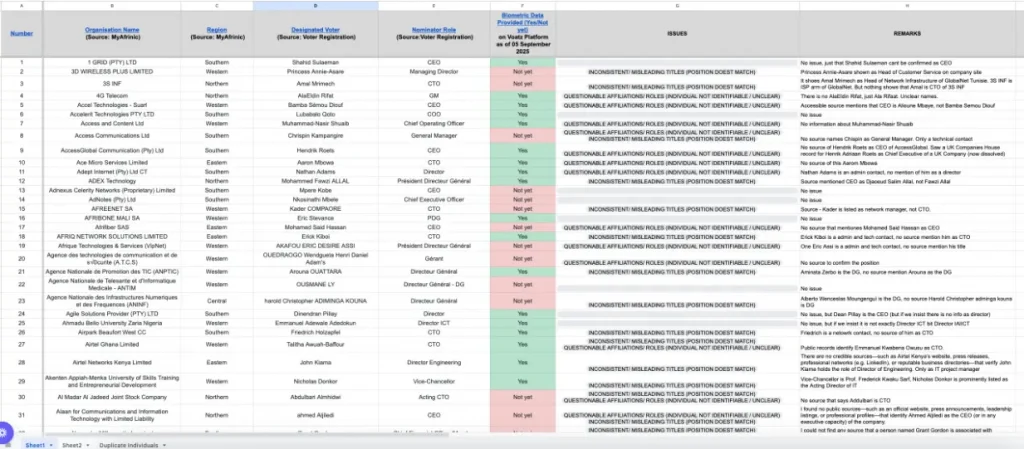- 70% of AFRINIC voter registrations flagged with due diligence issues, including false titles, duplicates, and unverifiable affiliations.
- Election Committee member threatened resignation after mid-process rule changes, compounding legitimacy concerns ahead of September’s vote.
A whistleblower from AFRINIC has revealed that a member of the Election Committee (ECom) at AFRINIC has threatened to resign over irregularities in the election process.
At the same time, an investigation by BTW Media has uncovered hundreds of potentially illegitimate voters posing as c-level executives in order to bypass verification safeguards.
In email text seen by BTW Media, one member of the ECom, writing to Official Receiver Gowtamsingh Dabee, noted the changing of voting procedure partway through the election process and threatened to resign as a result.
This concern over due process by a sitting member of the ECom suggests the beleaguered registry is still some way away from establishing the standards needed to be trusted as Africa’s IP address administrator.
Furthermore, BTW Media’s own investigation has uncovered hundreds of instances of potential fraud, inconsistencies in information provided, and other risks in the information submitted during voter registrations.
Voter fraud in AFRINIC elections
With the help of legal experts, BTW Media analysed all 581 registrations to date (September 7, 2025). We discovered numerous due diligence issues, from inconsistent and misleading job titles, to questionable or non-existent affiliations with the member company, to individuals being named as the verified voter on multiple – sometimes up to nine – registrations.
Of the 581 registrations analysed, 408 (70%) had at least one due diligence issue that would make that vote at least controversial, and potentially invalid.
Many had multiple due diligence issues that would render that vote inadmissible.
The most egregious of these are a potential transgressions of the voter registration standards, which stipulated that voters must be designated through a form signed by “a C-level company executive.” In all cases, there is no information about the name of the nominating person – only their job title is provided. In addition, only the name of the designated voter is provided, without any accompanying information such as role or affiliation with the company.
This lack of transparency is a serious loophole in the verification process.
If the nominating person and registered voter are the same person, in 218 cases the job title did not match the registered voter’s name. If the nominating person is a different individual, there is no identifying information about that person.
Biometrics missing
In addition, nearly a third of registered voters have yet to complete the biometric processing required in the new voting protocol. Introduced in this election in an attempt to thwart voter fraud, questions have already been raised about AFRINIC’s ability to safeguard important personal data such as biometrics, considering the recent privacy breach involving the emails of all AFRINIC members.
And while there is still time for non-compliant voters to provide their biometrics, this significant number could delay or complicate voting.
Duplicate voters
Another worrying issue we discovered was that of several registered voters appearing in the Voters Registry multiple times.
There were 56 instances where the same individual appears connected to more than one company.
The duplicates are concentrated in certain names and organizations.
Examples include one person appearing as the designated voter for two or more related companies, under slightly different company names; and companies registered in multiple regions (e.g., one in Southern Africa, another in the Indian Ocean) but represented by the same individual.
This creates a situation where a single individual controls multiple votes, something the new election guidelines were meant to restrict.
Our summarised report of the review can be seen below.
Voting for the elections, which were originally scheduled for June 2025 but were annulled after a dispute over a single proxy vote, is due to take place from September 10-12. But BTW Media’s investigation shows a level of fraud in the publicly accessible Voters Register that contaminates any possibility of a legally valid vote.
AFRINIC has been without a board and CEO since 2022 after corruption, mismanagement and a litany of ill-conceived legal cases plunged the registry into chaos. BTW Media has been closely monitoring the situation at AFRINIC on a daily basis. You can read all our AFRINIC coverage here.

AFRINIC voters registry – BTW Media’s due diligence review
The dataset reviewed covers 581 organizations registered as AFRINIC members with designated voters. Each entry includes the organization name, region, designated voter, their role, and whether they have completed biometric registration on the Voatz platform. Notes were also made where inconsistencies or risks were found.
Biometric status
419 voters (72%) have completed biometric registration.
162 voters (28%) have not yet done so.
This shows that while most are compliant, more than a quarter remain incomplete, which could delay or complicate voting.
Issues highlighted
Out of 581 entries, 408 organizations (around 70%) have at least one issue flagged. These issues fall mainly into three categories:
Inconsistent or Misleading Titles – 218 cases where the voter’s stated role (e.g., CEO, CTO) does not match external company records.
Questionable Affiliations or Roles – 158 cases where the individual cannot be clearly verified as belonging to the organization they are voting for.
Duplicate Representation – 56 instances where the same individual appears connected to more than one company and is able to submit multiple votes.
Key observations
Biometric readiness is uneven: almost 3 in 10 voters are not yet enrolled.
Discrepancies are common: most entries have some mismatch between claimed roles and public information.Duplicate cases are limited but significant: while not widespread, they raise concerns about concentration of voting power.